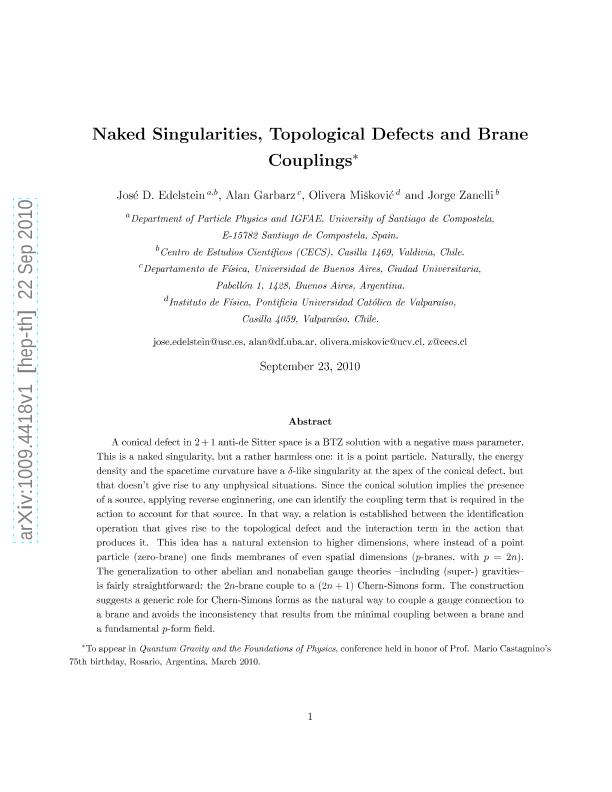Mostrar el registro sencillo del ítem
dc.contributor.author
Edelstein, Jose Daniel

dc.contributor.author
Garbarz, Alan Nicolás

dc.contributor.author
Miškovic, Olivera
dc.contributor.author
Zanelli, Jorge

dc.date.available
2019-01-15T19:48:41Z
dc.date.issued
2011-05
dc.identifier.citation
Edelstein, Jose Daniel; Garbarz, Alan Nicolás; Miškovic, Olivera; Zanelli, Jorge; Naked singularities, topological defects and Brane couplings; World Scientific; International Journal of Modern Physics D; 20; 5; 5-2011; 839-849
dc.identifier.issn
0218-2718
dc.identifier.uri
http://hdl.handle.net/11336/68080
dc.description.abstract
A conical defect in 2 + 1 anti-de Sitter space is a BTZ solution with a negative mass parameter. This is a naked singularity, but a rather harmless one: it is a point particle. Naturally, the energy density and the spacetime curvature have a δ-like singularity at the conical defect, but that does not give rise to any unphysical situations. Since the conical solution implies the presence of a source, applying reverse enginnering, one can identify the coupling term that is required in the action to account for that source. In that way, a relation is established between the identification operation that gives rise to the topological defect and the interaction term in the action that produces it. This idea has a natural extension to higher dimensions, where instead of a point particle (zero-brane) one finds membranes of even spatial dimensions (p-branes, with p = 2n). The generalization to other abelian and nonabelian gauge theories including (super-) gravities is fairly straightforward: the 2n-brane couples to a (2n + 1) ChernSimons form. The construction suggests a generic role for ChernSimons forms as the natural way to couple a gauge connection to a brane and avoids the inconsistency that results from the minimal coupling between a brane and a fundamental p-form field.
dc.format
application/pdf
dc.language.iso
eng
dc.publisher
World Scientific

dc.rights
info:eu-repo/semantics/openAccess
dc.rights.uri
https://creativecommons.org/licenses/by-nc-sa/2.5/ar/
dc.subject
Brane Couplings
dc.subject
Naked Singularities
dc.subject
Topological Defects
dc.subject.classification
Otras Ciencias Físicas

dc.subject.classification
Ciencias Físicas

dc.subject.classification
CIENCIAS NATURALES Y EXACTAS

dc.title
Naked singularities, topological defects and Brane couplings
dc.type
info:eu-repo/semantics/article
dc.type
info:ar-repo/semantics/artículo
dc.type
info:eu-repo/semantics/publishedVersion
dc.date.updated
2019-01-14T17:57:23Z
dc.journal.volume
20
dc.journal.number
5
dc.journal.pagination
839-849
dc.journal.pais
Singapur

dc.description.fil
Fil: Edelstein, Jose Daniel. Universidad de Santiago de Compostela; España. Centro de Estudios Científicos; Chile. Consejo Nacional de Investigaciones Científicas y Técnicas; Argentina
dc.description.fil
Fil: Garbarz, Alan Nicolás. Universidad de Buenos Aires. Facultad de Ciencias Exactas y Naturales. Departamento de Física; Argentina. Consejo Nacional de Investigaciones Científicas y Técnicas; Argentina
dc.description.fil
Fil: Miškovic, Olivera. Pontificia Universidad Católica de Valparaíso; Chile
dc.description.fil
Fil: Zanelli, Jorge. Centro de Estudios Científicos; Chile
dc.journal.title
International Journal of Modern Physics D

dc.relation.alternativeid
info:eu-repo/semantics/altIdentifier/doi/http://dx.doi.org/10.1142/S0218271811019177
dc.relation.alternativeid
info:eu-repo/semantics/altIdentifier/url/https://www.worldscientific.com/doi/abs/10.1142/S0218271811019177
dc.relation.alternativeid
info:eu-repo/semantics/altIdentifier/url/https://arxiv.org/abs/1009.4418
Archivos asociados
